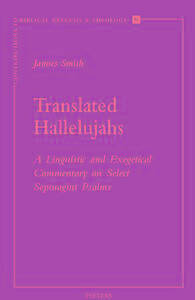
- Afhalen na 1 uur in een winkel met voorraad
- Gratis thuislevering in België vanaf € 30
- Ruim aanbod met 7 miljoen producten
- Afhalen na 1 uur in een winkel met voorraad
- Gratis thuislevering in België vanaf € 30
- Ruim aanbod met 7 miljoen producten
Zoeken
€ 38,00
+ 76 punten
Omschrijving
This book explores the meaning of five psalms in the Septuagint version (104, 105, 110, 111, 112), not as interpreted in later reception history but as originally intended by the translator. The author retraces the translator's path, accounting for translation choices by comparing the Greek with its Hebrew source, and measuring the impact of the translator's decisions upon the profile of the Psalter, such as the effect of semantic shifts and the extent to which Hebrew poetic features, lexical links and Pentateuchal intertextuality have been lost or preserved. Chapter 1 establishes a methodological framework in dialogue with past and present scholarship. Since the five Psalms studied in this book all begin with the word hallelujah, chapter 2 is dedicated to the meaning and function of this heading in the Old Greek Psalter. Chapters 3 through 7 comment on Psalms 104-105 and 110-112 respectively. Chapter 8 provides a summary and conclusions.
Specificaties
Betrokkenen
- Auteur(s):
- Uitgeverij:
Inhoud
- Aantal bladzijden:
- 300
- Taal:
- Engels
- Reeks:
- Reeksnummer:
- nr. 56
Eigenschappen
- Productcode (EAN):
- 9789042923843
- Verschijningsdatum:
- 8/02/2011
- Uitvoering:
- Paperback
- Formaat:
- Trade paperback (VS)
- Afmetingen:
- 150 mm x 229 mm
- Gewicht:
- 476 g

Alleen bij Standaard Boekhandel
+ 76 punten op je klantenkaart van Standaard Boekhandel
Beoordelingen
We publiceren alleen reviews die voldoen aan de voorwaarden voor reviews. Bekijk onze voorwaarden voor reviews.







